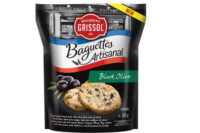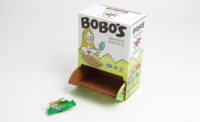A desire for sustainability is one of the key factors driving the latest packaging innovations in baggers, closing equipment, twist ties, clips, zippers, resealable materials, heat sealing, and ultrasonic sealing. An eco-consciousness is influencing brand decisions. Demand for single-serve packaging, ready-to-eat meals, and enhanced convenience are other factors. In addition, a growing focus on health and wellness is having an impact.
These trends are prompting changes in packaging material selection across the snack and bakery industry. The growing importance of health and wellness has propelled the use of transparent films and windows. See-through packaging enables consumers to see the quality and freshness of the contents, which underscores the promise of a wholesome, healthy product.
Sustainable and efficient
Consumer demand for greater eco-consciousness is influencing brand decisions on packaging formats, as well. “With a strong push for more-sustainable design—and an emphasis on substrates that are compostable, biodegradable, light-weighted, recyclable, or made with recycled material—consumer packaged goods manufacturers face new challenges in handling bags that often are thinner or more delicate than their predecessors,” says Jorge Izquierdo, vice president, market development, PMMI, Reston, VA.
The right closing and bagging machinery can help brands more efficiently adapt to these modifications and optimize efficiency on the line. “Bagging equipment must provide easy transitions between runs of various products and for different-sized portions. Equipment should be able to remotely support users to monitor performance,” Izquierdo adds.
Vendors agree that sustainability is driving innovation. “Customers are looking for more sustainable materials. Film vendors are working to develop a more recyclable film for bags. As new materials become available, bagging equipment will need to be adjusted and tested,” says Angela McDaniel, marketing and sales coordinator, Formost Fuji, Woodinville, WA. She also sees growing demand for smaller-count packages and half loaves of bread.
Ultrasonic sealing can help bakery/snack producers preserve freshness and achieve sustainability goals, according to Pat Seitz, vice president packaging, Herrmann Ultrasonics, Bartlett, IL. He sees growing demand to utilize more sustainable and recyclable films, such as paper-based materials. “Ultrasonic sealing technology has several benefits to offer in this context, as it doesn’t add heat from the outside, but only generates the required melting temperature in the sealant layer. Also, ultrasonic sealing reduces the amount of energy consumed and increases overall equipment effectiveness, because no warm-up is required.”
The green credentials of brands are increasingly under scrutiny, suggests Anurag Mitra, product marketing manager, TNA North America, Dallas. “Whether it is packaging materials, waste, or energy usage, sustainability has become a powerful influencer on consumers’ brand and product choices, and this is driving the need for more sustainable equipment design across the packaging industry.”
Mitra says packaging systems that incorporate single-serration jaw technology can help manufacturers reduce film consumption by reducing the film length required per bag. “The jaw-set seal has a similar appearance to an ultrasonic seal, but at a fraction of the price. Providing major film savings due to its smaller seal area, the single-serration jaw also allows an increase in bag volume while maintaining the same bag length.”
Reducing plastic in packaging is a trend that continues to rise in popularity, according to Jay Milbrandt, president, Bedford Industries, Worthington, MN. The company’s Bedford Twist Tie, which it manufactures with eco-friendly material such as paper, has 80 percent less plastic than standard bakery clips. The twist tie also provides a tight seal to ensure product freshness. These features have incentivized bakers to look into converting to twist tie as opposed to other bag closures.
Milbrandt also sees more domestic bakers showing interest in the company’s ClipBand. “Historically, the ClipBand has been a popular closure in European markets, but domestic bakers are now adopting it to give their specialty breads a more-international look.”
Milbrandt says bag clips can offer snack and bakery producers an opportunity to create points of differentiation among brands. “Our custom-printed CloseIt Clip allows for printing brand, logo, or seasonal and holiday prints. Our CloseIt Tag offers custom printing and customizable shapes.”
Kwik Lok Corp., Yakima, WA, continues to see demand for sustainable products, as well. “Customers are asking us for solutions that help them to meet current or expected regulations. One of the challenges is to balance the need to reduce carbon emissions and address concerns about plastic,” says Karen Reed, marketing and communications director. The company’s Eco-Lok product does both by cutting carbon emissions by up to 20 percent and replacing up to 20 percent of petroleum-based material with renewable corn and potato starch.
Advanced features
Kwik Lok customers also are looking for solutions that improve food safety. One example that meets this request is the company’s 909 technology, which provides a uniform “laser stitch” that indicates if a bag has been opened and can be re-closed for future use.
More consumers are requesting food products without preservatives, which can shorten shelf life, according to Lynn Miranda, sales and marketing director, All Packaging Machinery, Ronkonkoma, NY. “Customers are asking for nitrogen-flush or vacuum-sealing machinery to remove air, which may help extend shelf life. We manufacture band sealers and defer to our distributors to provide the nitro-flush or vacuum systems.”
The latest closing and bagging equipment often offers improved efficiencies. All Packaging Machinery offers a band sealer that can seal slider-zippered pouches. The dual-head, vertical band sealer can make two seals on the bag in one pass. The system is designed to seal slider-zipper-style, pre-made pouches below and above the slider zipper. “This type of packaging will be important with bakery products that contain cannabidiol,” Miranda suggests.
Burford Corp., Maysville, OK, offers Twist Tyer machines for horizontal or vertical-fill applications that operate within a wide speed range. The company recently introduced the Burford Connect, which can improve efficiencies by monitoring equipment performance and providing critical preventative maintenance feedback. “This plug-and-play system offers interactive troubleshooting tools that facilitate setup and repair. It offers direct access to manuals and wiring diagrams,” says Mitch Lindsey, senior sales account manager.
Kwik Lok Corp. has unveiled the 910A Automatic Bag Closing Machine, which can close up to 120 bags per minute. Upgrades include a lighter, more-compact design, easy-to-clean aluminum and stainless-steel construction, and user-friendly mechanical components that offer easy accessibility for maintenance. All 910A machines run closure labels for coding, tracking, and promotional messages.
A new trend that is catching on, especially within the bakery/snack industry, is the use of Velcro-like material to close pouches, according to Christine Duncan, marketing manager, flexibles, Matrix Packaging Machinery, Saukville, WI. Ease of use is one advantage. “The Velcro-style seal is a strong option for products that do not need a hermetic seal, such as bulky snacks including potato chips, cookies, crackers and nuts–products that are consumed within a few days of opening. Since Velcro-style closures offer easy access to contents through its wide opening, they match well with personal-size or standard-size bags.”
Velcro-style closures are part of the film commonly used for snack and bakery products, and can be run on vertical form/fill/seal machines. “We are seeing more Velcro closures on Doyen-style (stand-up) pouches, which continue to grow in popularity among retailers and consumers,” Duncan adds.
Looking ahead, Mitra says that small, convenient bags are likely to remain a popular option for portion control, as are resealable packs. “The latter also promotes the ‘use, store, and reuse’ concept, as opposed to ‘use and throw,’ thus promoting sustainability. We expect the quest for fully biodegradable flexible packaging options to remain top of the agenda, so that brands can appeal to socially conscious consumers worldwide.”




